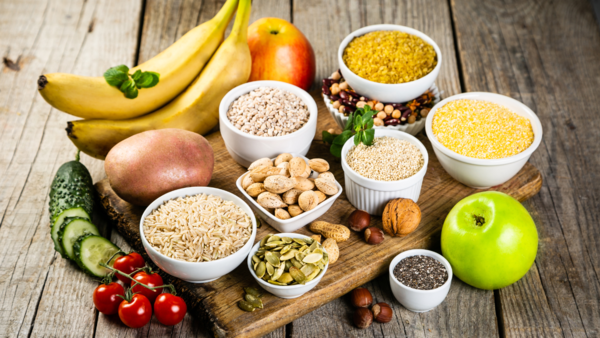What is a “no raw food” diet?
As the name suggests, a “raw-free” diet involves avoiding raw foods, including vegetables, fruits, meats and dairy products. Instead, all food eaten has been cooked or otherwise processed so that it is no longer in its natural, raw state. Vidya Balaam follows a diet that ensures her diet is not only safe, but also nutritious and easy to digest.

Figure: Canvas
Why should you avoid raw foods?
Reduce foodborne illness: Raw foods, especially meat, eggs, and unpasteurized dairy products, are potential carriers of harmful bacteria such as salmonella, E. coli, and listeria. These pathogens can cause serious foodborne illness. Cooking these foods thoroughly kills these pathogens and significantly reduces the risk of infection.
Easier digestion and utilization of nutrients: Cooking foods breaks down complex proteins and fibers, making them easier to digest. This is especially beneficial for people with digestive issues such as irritable bowel syndrome (IBS) or other gastrointestinal disorders. Cooking can increase the bioavailability of certain nutrients. For example, the antioxidants lycopene in tomatoes and beta-carotene in carrots are more easily absorbed after cooking. Cooking can deactivate certain antinutrients, such as phytates and oxalates, reducing mineral absorption.
How to follow a “no raw food” diet
Although cooking can enhance Nutrient absorption, it’s important to use cooking methods that retain the most nutrients. Steaming, microwaving and sautéing are preferred methods as they use less water and reduce nutrient loss. Boiling can cause the loss of water-soluble vitamins such as vitamin C and certain B vitamins. Therefore, adding a variety of cooking methods helps preserve the nutritional value of food.
A Balanced diet Essential when following a “no raw food” diet. A variety of cooked vegetables, fruits, grains and proteins must be included to ensure adequate nutritional intake. This method helps offset any nutrient losses that occur during the cooking process and ensures your body is getting all the essential vitamins and minerals it needs.
Should you avoid raw food altogether?
While a “raw-free” diet has its benefits, it’s also important to maintain balance. Raw foods provide essential nutrients, enzymes and fiber that are beneficial to overall health. A balanced approach, including cooked and raw foods, tailored to individual health needs, is often the best strategy.
How to take vitamin D supplements?
function loadGtagEvents(isGoogleCampaignActive) { if (!isGoogleCampaignActive) { return; } var id = document.getElementById('toi-plus-google-campaign'); if (id) { return; } (function(f, b, e, v, n, t, s) { t = b.createElement(e); t.async = !0; t.defer = !0; t.src = v; t.id = 'toi-plus-google-campaign'; s = b.getElementsByTagName(e)(0); s.parentNode.insertBefore(t, s); })(f, b, e, 'https://www.googletagmanager.com/gtag/js?id=AW-877820074', n, t, s); };
function loadSurvicateJs(allowedSurvicateSections = ()){ const section = window.location.pathname.split('/')(1) const isHomePageAllowed = window.location.pathname === '/' && allowedSurvicateSections.includes('homepage')
if(allowedSurvicateSections.includes(section) || isHomePageAllowed){ (function(w) { var s = document.createElement('script'); s.src="https://survey.survicate.com/workspaces/0be6ae9845d14a7c8ff08a7a00bd9b21/web_surveys.js"; s.async = true; var e = document.getElementsByTagName('script')(0); e.parentNode.insertBefore(s, e); })(window); }
}
window.TimesApps = window.TimesApps || {}; var TimesApps = window.TimesApps; TimesApps.toiPlusEvents = function(config) { var isConfigAvailable = "toiplus_site_settings" in f && "isFBCampaignActive" in f.toiplus_site_settings && "isGoogleCampaignActive" in f.toiplus_site_settings; var isPrimeUser = window.isPrime; if (isConfigAvailable && !isPrimeUser) { loadGtagEvents(f.toiplus_site_settings.isGoogleCampaignActive); loadFBEvents(f.toiplus_site_settings.isFBCampaignActive); loadSurvicateJs(f.toiplus_site_settings.allowedSurvicateSections); } else { var JarvisUrl="https://jarvis.indiatimes.com/v1/feeds/toi_plus/site_settings/643526e21443833f0c454615?db_env=published"; window.getFromClient(JarvisUrl, function(config){ if (config) { loadGtagEvents(config?.isGoogleCampaignActive); loadFBEvents(config?.isFBCampaignActive); loadSurvicateJs(config?.allowedSurvicateSections); } }) } }; })( window, document, 'script', );







